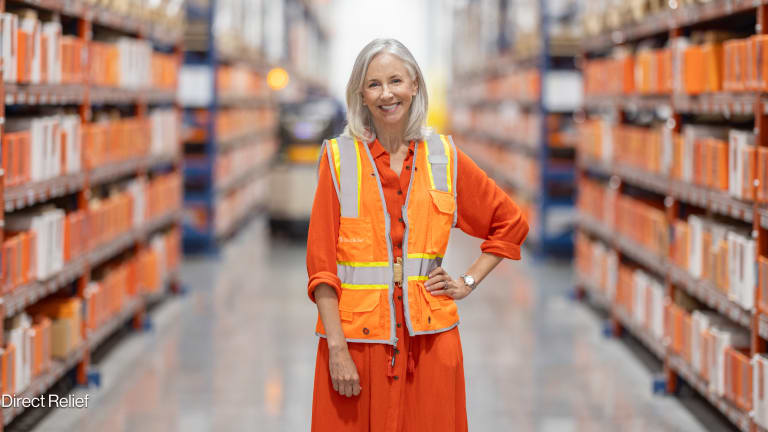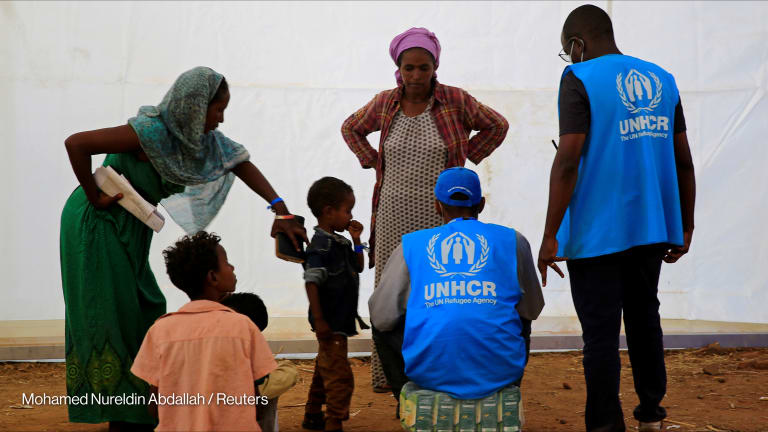Ebola puts humanitarian supply chains to the test
Humanitarian supply chains are designed to respond to the unknown and adjust to the unpredictable. But in the face of the ongoing Ebola in West Africa, even the most robust relief supply chains are being put to the test.
In humanitarian emergencies, logistics and supply chain management ensure quick and appropriate delivery of supplies to populations in need — often making the difference between life and death. This is even more true in the context of the Ebola epidemic currently ravaging Western Africa, an extremely time-pressed emergency where the slightest gap or delay in the logistics response can result in an instant increase in suffering and life loss. The very nature of relief supply chains is to operate in dynamic and chaotic environments. But in the face of the largest Ebola outbreak ever recorded, achieving the well-established humanitarian goal of delivering the right supplies in the right quantities to the right locations at the right time has proven to be a massive — and mostly unique — challenge, even for the most seasoned emergency responders. Starting ‘from scratch’ Major organizations currently involved in the fight against Ebola all have elaborate humanitarian supply chains and rapid response systems to support affected people at the onset of an emergency. As an example, many humanitarian agencies and donor countries have signed up to use the six U.N. Humanitarian Response Depots strategically located around the world to easily preposition and deploy assistance within 24 to 48 hours of a disaster. But because they are unlike any other supplies used to protect against other widespread infectious diseases, Ebola-related supplies are not as readily available. Measuring less than a micron and spreading through bodily fluids such as vomit, blood, sweat and mucus, the Ebola virus entails all protective and burial gears to be as impermeable as possible — and thus specifically manufactured for it. “Many items have to be manufactured specifically to a standard that can deal with the Ebola virus, they’ve not been sitting on shelves,” Rishi Ramrakha, head of the zone logistics unit at the International Federation of Red Cross and Red Crescent Societies, told Devex. “Therefore there’s been a lead time to receive the appropriate goods.” The “novelty” of this Ebola outbreak, combined with its unprecedented scale, made it impossible for aid responders to rely on their usual networks of suppliers and prepositioned stocks — forcing them to acquire the necessary expertise, undertake new market assessments and create an appropriate supply chain. “We have significantly changed the types of items we’re purchasing for our partners, which means we’ve started the [procurement] process from scratch,” explained Jean-Francois Milhaud, manager of the UNHRD in Accra, Ghana. Adding to the difficulty is the absence of a harmonized international set of standards for the selection of Ebola-related supplies — particularly personal protective equipment and burial cadaver bags — which caused continuous shifts in product specifications, as the gravitas of Ebola set in and responders honed their knowledge on care and health worker safety. “One of the challenges we are facing is the constant changes in quantities, but also the fluctuations in product specifications and protocols, which force us to adjust the supply chain accordingly,” Isabelle Sechaud, unit manager of IFRC’s global logistics services, told Devex. Dead body bags have to be more resistant, for example, especially since two bodies are usually placed in each bag. Overwhelmed suppliers are not always able to keep up with such volatile and high demand, thereby adding to lead time. Capacity constraints are made even starker by the handful of suppliers — as few as four or five — that are able to manufacture equipment in the required quality, quantity and price. “I think the problem that people need to understand is that the upstream pipeline is really congested and narrow,” stressed Jean-Cedric Meeus, chief of emergency at the UNICEF supply division. As the humanitarian community grapples with limited manufacturer capacity and low predictability, it’s important to note that constraints in the upstream pipeline of supply chains inevitably lead to difficulties down the line. These are further compounded by external factors that are beyond the control of aid responders. “As we have a constrained supply chain, as soon as we receive a commodity, we need to send it. That of course has a huge impact on our freight budget,” Meeus said. “But we are also bringing a lot of supplies from China, which happens to be one of the main suppliers of Christmas presents. This has an impact on availability of carriers [and] these air constraints mean that we cannot start piling up stocks or sea freight enough,” he added. Managing the unpredictable In Guinea, Sierra Leone and Liberia — the three countries hit hardest by Ebola — virus transmission continues to be widespread and intense, infecting more than 5,000 people in the past month alone, according to statistics published by the World Health Organization. Humanitarian supply chains are designed to respond to random events and adjust to high uncertainty in emergency type, size, location and timing. But because this outbreak has absolutely no precedent, coordination and information sharing had to be undertaken at each and every segment of the supply chain — whether it’s to define and forecast needs, map and select suppliers, or deliver and distribute supplies. All of this to build the overall agility and efficiency of the response. One illustrative example is how the main purchasers of personal protective equipment have agreed on projections and supply allocation for the next few months. “We have managed to discuss and agree with UNICEF, WHO and Médecins Sans Frontières on a way to share what is the on the market for the next three months,” IFRC’s Sechaud highlighted. “With the calculations and forecasts of other major organizations that are buying protective equipment, we can guess the needs for the next six months. And we believe that by preordering 80 percent of this guess, we will definitely be under the reality of the needs,” UNICEF’s Meeus further expanded. Broader efforts to match supply to demand, streamline the procurement process and facilitate the downstream supply chain are also underway. From the very beginning of the outbreak, MSF has been quantifying needs and determining the standards for health worker safety, while the U.N. Logistics Cluster has been facilitating the entry and final delivery of supplies on behalf of many humanitarian organizations. More recently, UNICEF convened a conference with partners and manufacturers to discuss better management of personal protective equipment supply chains. Organizations involved in the logistical response to Ebola are also taking flexibility and adaptability to a whole new level — learning as they go, sharing lessons learned and testing new strategies. “We’re all adapting and accepting each other’s best practices,” Cesar Arroyo, regional coordinator of the common services for the Ebola response at World Food Program, told Devex. “For example, UNHRD is now storing different items on behalf of organizations that are not typically stored there [and] moving the concept of having universal storage hubs holding goods for many organizations into the deep field.” Keeping the humanity In spite of the international community’s best efforts to tackle head on the most salient gaps in the Ebola emergency response’s supply chain, the deadly nature of this disease sheds light on a logistical challenge that is both formidable and singular. “Everything needs to be decided in coordination with communities. Not everybody wants to have an Ebola treatment or community care center nearby because they are scared of further contamination … so it is always difficult to know where the supplies will go,” Meeus emphasized. Emotions and stigma surrounding Ebola are high, as countless families and communities have been shattered by the loss of several loved ones. Such a situation points to the unprecedented necessity for humanitarian agencies to take into account the emotional and individual impact of the emergency when implementing their logistical response. “The nature of this epidemic is malignant and pervasive, posing management challenges that we have never faced before,” Rob MacGillivray, country director for Save the Children in Sierra Leone, told Devex. “A few weeks ago, we had a contact of a colleague who contracted Ebola. And the challenge was to figure out how you support people in that kind of situation. So a big part of the logistics is the individual responsibility that Save the Children has toward its staff — and that’s something you don’t get in earthquakes or floods.” Check out more insights and analysis provided to hundreds of Executive Members worldwide, and subscribe to the Development Insider to receive the latest news, trends and policies that influence your organization.
In humanitarian emergencies, logistics and supply chain management ensure quick and appropriate delivery of supplies to populations in need — often making the difference between life and death.
This is even more true in the context of the Ebola epidemic currently ravaging Western Africa, an extremely time-pressed emergency where the slightest gap or delay in the logistics response can result in an instant increase in suffering and life loss.
The very nature of relief supply chains is to operate in dynamic and chaotic environments. But in the face of the largest Ebola outbreak ever recorded, achieving the well-established humanitarian goal of delivering the right supplies in the right quantities to the right locations at the right time has proven to be a massive — and mostly unique — challenge, even for the most seasoned emergency responders.
This story is forDevex Promembers
Unlock this story now with a 15-day free trial of Devex Pro.
With a Devex Pro subscription you'll get access to deeper analysis and exclusive insights from our reporters and analysts.
Start my free trialRequest a group subscription Printing articles to share with others is a breach of our terms and conditions and copyright policy. Please use the sharing options on the left side of the article. Devex Pro members may share up to 10 articles per month using the Pro share tool ( ).
Manola De Vos is an Engagement Lead for Devex’s Analytics team in Manila. She leads and designs customized research and analysis for some of the world’s most well-respected organizations, providing the solutions and data they need to grow their partner base, work more efficiently, and drive lasting results. Prior to joining Devex, Manola worked in conflict analysis and political affairs for the United Nations, International Crisis Group and the EU.








